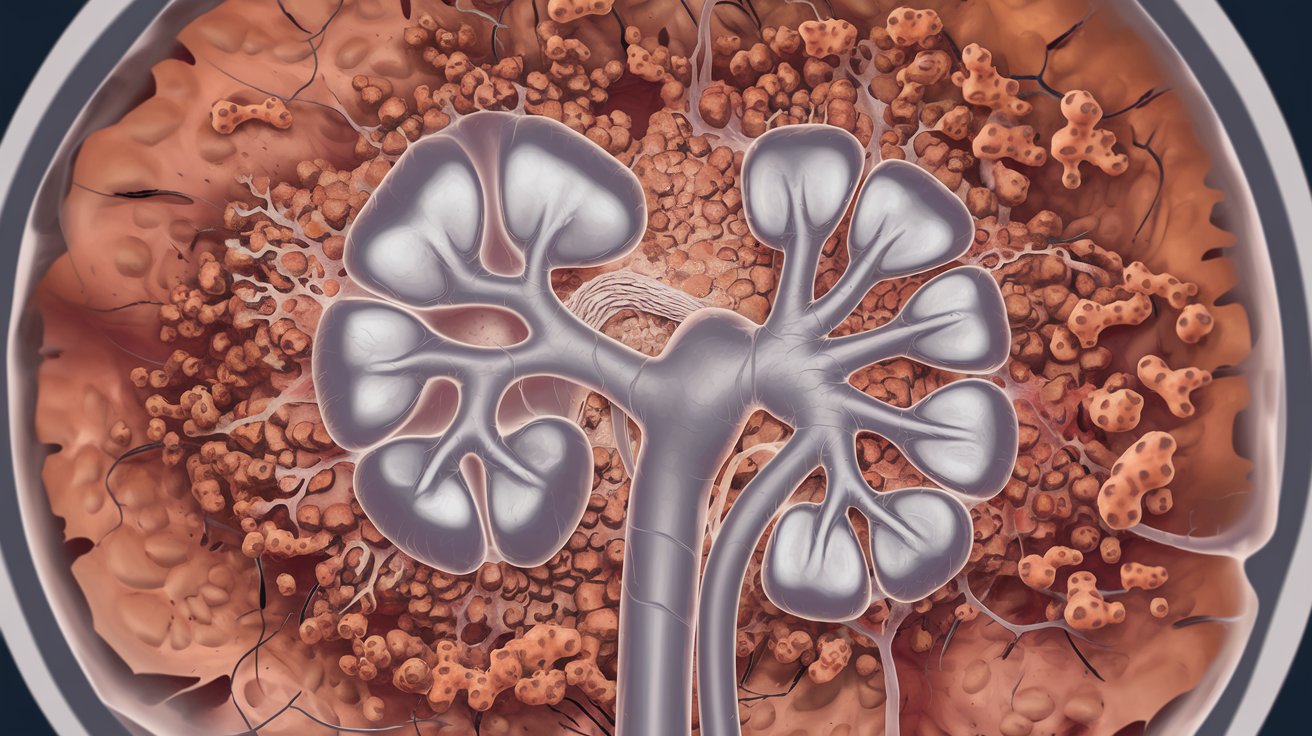
Nephritic syndrome is a kidney condition marked by inflammation of the glomeruli, the tiny filters in your kidneys. This inflammation can lead to symptoms like blood in the urine (hematuria), protein in the urine (proteinuria), and reduced kidney function. Unlike nephrotic syndrome, which involves heavy protein loss, nephritic syndrome usually has less protein in the urine. Causes range from infections and autoimmune diseases to certain medications. Understanding nephritic syndrome is crucial for managing symptoms and preventing complications like chronic kidney disease or cardiovascular issues. This article covers 45 essential facts about nephritic syndrome, from its history and causes to diagnosis and treatment options.
Key Takeaways:
- Nephritic syndrome causes kidney inflammation, leading to symptoms like blood in urine and impaired kidney function. It can be caused by infections, autoimmune diseases, and other systemic conditions.
- Management involves addressing symptoms and underlying causes, with treatments like fluid management, blood pressure control, and immunosuppressive therapy. Patient education and support are crucial for effective care.
Understanding Nephritic Syndrome
Nephritic syndrome is a kidney condition marked by inflammation of the glomeruli, the tiny filters in the kidneys. This inflammation can lead to various symptoms and complications. Let's explore some key facts about this condition.
-
Definition and Pathophysiology
Nephritic syndrome involves glomerular inflammation, causing hematuria (blood in the urine) and impaired kidney function. This inflammation can stem from infections, autoimmune diseases, and other systemic conditions. -
History of Nephritic Syndrome
The understanding of nephritic syndrome has evolved over centuries. Early observations date back to Hippocrates, but the modern concept developed significantly in the 19th century with Richard Bright's work.
Clinical Presentation and Symptoms
Patients with nephritic syndrome exhibit a range of symptoms. These can vary in severity depending on the underlying cause.
-
Clinical Presentation
Common symptoms include hematuria, proteinuria (usually in the subnephrotic range), and impaired kidney function. Hypertension, edema, and fatigue are also frequent. -
Symptoms in Children
Children often present with visible blood in the urine, swelling of the face, hands, and feet, fatigue, and loss of appetite. These symptoms can be severe and require prompt medical attention. -
Symptoms in Adults
Adults may experience similar symptoms but with additional complications like hypertension, severe fluid retention, and kidney failure, potentially leading to dialysis or transplantation.
Causes and Types
Nephritic syndrome can result from various causes, each with distinct pathological features.
-
Causes of Nephritic Syndrome
Infections, autoimmune diseases, systemic conditions like diabetes and hypertension, and certain medications can all induce nephritic syndrome. -
Types of Nephritic Syndrome
Several types exist, including Acute Poststreptococcal Glomerulonephritis (APSGN), Lupus Nephritis, Rapidly Progressive Glomerulonephritis (RPGN), and Membranoproliferative Glomerulonephritis.
Diagnosis and Epidemiology
Diagnosing nephritic syndrome involves a combination of clinical evaluation, laboratory tests, and sometimes renal biopsy.
-
Diagnosis
Urinalysis shows hematuria and proteinuria. Blood tests reveal elevated serum creatinine levels. Imaging studies and renal biopsy provide further insights. -
Epidemiology
Nephritic syndrome affects all ages but is more common in children and young adults. The incidence varies by cause and geographic location, with APSGN more prevalent in developing countries.
Complications and Management
Nephritic syndrome can lead to several complications, requiring comprehensive management strategies.
-
Complications
Potential complications include Chronic Kidney Disease (CKD), End-Stage Renal Disease (ESRD), cardiovascular disease, and anemia. -
Treatment
Treatment focuses on managing symptoms and addressing the underlying cause. This may involve fluid management, blood pressure control, pain management, and immunosuppressive therapy. -
Conservative Management
Non-pharmacological interventions include dietary restrictions, rest, and regular monitoring of kidney function through blood tests and urinalysis.
Diagnostic Tools
Various diagnostic tools help in the accurate diagnosis and monitoring of nephritic syndrome.
-
Renal Biopsy
Renal biopsy is crucial for definitive diagnosis, providing detailed information about glomerular damage through histopathological examination and immunofluorescence. -
Imaging Studies
Ultrasound, CT scans, and MRI are used to assess kidney size, structure, and function without ionizing radiation. -
Laboratory Tests
Essential tests include urinalysis to detect hematuria and proteinuria, and blood tests to measure serum creatinine levels and electrolytes.
Prognosis and Prevention
The prognosis for nephritic syndrome varies, and preventive measures can help reduce the risk of developing the condition.
-
Prognosis
Mild cases often resolve with conservative management, while severe cases may require immunosuppressive therapy and close monitoring to prevent complications. -
Prevention
Preventive measures include vaccinations to prevent streptococcal infections and managing chronic conditions like hypertension and diabetes.
Differential Diagnosis
Differentiating nephritic syndrome from other kidney diseases is crucial for accurate diagnosis and treatment.
-
Differential Diagnosis
Other kidney diseases to consider include nephrotic syndrome, acute tubular necrosis (ATN), and interstitial nephritis. -
Nephritic Syndrome vs Nephrotic Syndrome
Key differences include the level of proteinuria and the presence of generalized edema in nephrotic syndrome, compared to subnephrotic proteinuria and localized edema in nephritic syndrome.
Clinical Recommendations and Evidence-Based Medicine
Effective management of nephritic syndrome relies on clinical recommendations and evidence-based medicine.
-
Clinical Recommendations
Recommendations include fluid and sodium restriction, antihypertensive therapy, and regular monitoring of kidney function. -
Evidence-Based Medicine
Guidelines emphasize the importance of renal biopsy for definitive diagnosis, immunosuppressive therapy for autoimmune causes, and conservative management for mild cases.
Patient Education and Support
Educating patients and providing support is crucial for managing nephritic syndrome effectively.
-
Patient Education
Educating patients on dietary restrictions, medication adherence, and symptom monitoring is essential for effective management. -
Social Support
Family support and joining support groups can provide emotional support and practical advice for patients.
Complications in Pregnancy
Nephritic syndrome can complicate pregnancy, requiring careful management.
- Complications in Pregnancy
Potential complications include preeclampsia and an increased risk of premature birth due to hypertension and fluid retention.
Chronic Kidney Disease (CKD) and End-Stage Renal Disease (ESRD)
Nephritic syndrome can lead to chronic kidney disease and end-stage renal disease, requiring long-term management.
-
Chronic Kidney Disease (CKD)
CKD involves progressive kidney damage and gradual loss of kidney function over time. -
End-Stage Renal Disease (ESRD)
ESRD is the final stage of CKD, requiring dialysis or kidney transplantation to replace lost kidney function.
Cardiovascular Disease and Anemia
Nephritic syndrome increases the risk of cardiovascular disease and anemia, necessitating comprehensive care.
-
Cardiovascular Disease
Hypertension and fluid retention increase the risk of heart disease in patients with nephritic syndrome. -
Anemia
Impaired kidney function reduces red blood cell production, leading to anemia and symptoms like fatigue and shortness of breath.
Bone Disease and Nutritional Deficiencies
Patients with nephritic syndrome may experience bone disease and nutritional deficiencies, requiring careful management.
-
Bone Disease
Conditions like osteoporosis and osteomalacia can result from impaired calcium and vitamin D metabolism. -
Nutritional Deficiencies
Protein restriction and electrolyte imbalances are common in patients with chronic kidney disease.
Psychological Impact and Quality of Life
Nephritic syndrome can significantly impact a patient's psychological well-being and quality of life.
-
Psychological Impact
Managing stress, anxiety, and depression is crucial for patients with nephritic syndrome. -
Quality of Life
Improving symptom management and providing psychological support can enhance the quality of life for patients.
Healthcare Access and Cultural Considerations
Access to healthcare and cultural considerations play a vital role in managing nephritic syndrome.
-
Healthcare Access
Regular check-ups and knowing when to seek emergency care are essential for managing nephritic syndrome. -
Cultural Considerations
Adapting dietary restrictions to cultural preferences and integrating traditional medicine practices with conventional treatment can improve patient outcomes.
Global Health Disparities and Research
Addressing global health disparities and ongoing research are crucial for improving the management of nephritic syndrome.
-
Global Health Disparities
Limited healthcare resources and stigma associated with kidney disease in some cultures can affect access to care. -
Research and Development
Ongoing research aims to improve management through new immunosuppressive therapies and understanding genetic factors contributing to the disease.
Public Awareness and Collaborative Care
Raising public awareness and fostering collaborative care are essential for early detection and effective management of nephritic syndrome.
-
Public Awareness
Educational programs and screening initiatives can help detect kidney disease early and improve management. -
Collaborative Care
Multidisciplinary teams and patient-centered care can enhance outcomes for patients with nephritic syndrome.
Economic Burden and Ethical Considerations
The economic burden and ethical considerations are important aspects of managing nephritic syndrome.
-
Economic Burden
High healthcare costs and reduced productivity due to illness can significantly impact patients and their families. -
Ethical Considerations
Ensuring informed consent and respecting patient autonomy in decision-making are crucial ethical considerations.
Informed Decision-Making and Patient Education Materials
Empowering patients with knowledge and resources is vital for effective management of nephritic syndrome.
-
Informed Decision-Making
Understanding treatment options and their potential risks and benefits helps patients make informed decisions. -
Patient Education Materials
Clear and concise brochures and online resources can provide valuable information to patients.
Cultural Sensitivity and Technology Integration
Cultural sensitivity and technology integration can enhance patient education and management of nephritic syndrome.
-
Cultural Sensitivity
Using culturally sensitive language and illustrations in patient education materials can improve understanding and adherence. -
Technology Integration
Telemedicine and mobile apps can facilitate remote consultations and help patients track symptoms and medication adherence.
Future Directions
Advancements in personalized medicine and stem cell therapy hold promise for the future of nephritic syndrome management.
- Future Directions
Personalized medicine tailors treatment to individual patients based on genetic profiles, while stem cell therapy offers potential for repairing damaged kidneys.
Understanding Nephritic Syndrome
Nephritic syndrome is a complex kidney condition marked by glomerular inflammation, leading to symptoms like hematuria, proteinuria, and impaired kidney function. It can arise from infections, autoimmune diseases, systemic conditions, or medications. Diagnosing involves urinalysis, blood tests, imaging, and sometimes a renal biopsy. Treatment focuses on managing symptoms and underlying causes, often requiring fluid and sodium restrictions, antihypertensive medications, and possibly immunosuppressive therapy.
Complications can include chronic kidney disease, end-stage renal disease, cardiovascular issues, anemia, and bone disease. Prevention involves managing infections and chronic conditions. Patient education, social support, and access to healthcare are crucial for effective management. Ongoing research aims to improve treatments and outcomes. Understanding nephritic syndrome's intricacies helps in providing better care and improving patients' quality of life.
Frequently Asked Questions
Was this page helpful?
Our commitment to delivering trustworthy and engaging content is at the heart of what we do. Each fact on our site is contributed by real users like you, bringing a wealth of diverse insights and information. To ensure the highest standards of accuracy and reliability, our dedicated editors meticulously review each submission. This process guarantees that the facts we share are not only fascinating but also credible. Trust in our commitment to quality and authenticity as you explore and learn with us.


